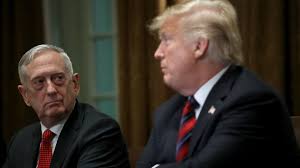It is the week before Christmas, 2018. President Trump issued another “tweet” two days ago about removing all U.S. troops from Syria. Nothing illegal about that; it makes sense that a U.S. president heads foreign policy, with the advice and consent of the Senate, and the U.S. Constitution spells that out. Over many years, Congress has ceded extraordinary powers to the President, to where the Commander in Chief is solely entrusted with nuclear codes and the power to commit U.S. troops to foreign wars without approval by Congress. So, as the President may legally commit U.S. troops to serve in foreign conflicts, he may surely bring them home.
Historically, however, U.S. Presidents have consulted with Congress, or at least worked closely with the Pentagon and the Joint Chiefs of Staff of the Armed Services. Legally, President Trump does not have to follow suit, but his declarations about leaving Syria made very little sense to people familiar with the situation, especially the Secretary of Defense, James Mattis. Secretary Mattis tendered his resignation in the wake of Trump’s “leaving Syria tweet,” a resignation that gives evidence of little to no collaboration between the President and others.
As Heather Digby Parton wrote in Salon,
“On Thursday Defense Secretary Jim Mattis went to the White House to try to talk the president out of his abrupt withdrawal from Syria and ended up resigning in protest. Mattis circulated his resignation letter, which pretty much says it all. He couldn’t continue to work with a president who didn’t align with his philosophy, which he described as a belief in supporting American allies and standing up to American adversaries.”
It is also hard to recall anything remotely similar since World War II, where a U.S. President so obviously rejects the advice of his Secretary of Defense and causes him to resign. The leaving Syria tweet was only part of an unusually tumultuous week in Washington and beyond.
Much of the concern in the U.S and beyond turned on whether American can be regarded as a reliable partner in a volatile, uncertain, and dangerous world, where collaboration among Allies is essential to maintaining order and freedom. The Kurds have learned that they cannot trust the U.S., and U.S. citizens can’t even be sure whose side we are really on. The evident winners of Trump’s leaving Syria tweet are Russia, Turkey, and Iran; it’s more than puzzling how Trump’s avowed policy of trying to curb Iranian influence in the Middle East seems entirely absent in this decision
Many were concerned what would happen to the Kurds, who fought loyally with the U.S. against ISIS; would the “power vacuum” caused by the withdrawal of 2,000 remaining troops leave them vulnerable to Syria’s Assad, or the Turks. While nature may abhor a vacuum, Russia, Assad, and Turkey were evidently pleased to see the opening.
Whether you regard the President’s decision on U.S. troops in Syria as “right” or “wrong,” the decision process does matter. The Constitution envisions a more collaborative government, with the President (as Commander in Chief) consulting with Congress (which has the power to declare war and initial budgetary responsibility for government spending, with the President’s approval). And, historically, the President does not make decisions in a vacuum, but consults with military and national security experts.
Even if you believe that the President has a “great brain,” or even “the greatest brain,” the old adage applies: two heads are better than one. It may be perfectly legal for President Trump to make utterly unilateral decisions on important matters of foreign policy, but it is indeed wrong. When many of his “tweets” hit the fan, the results are often pointlessly disruptive.
Dec. 21, 2018
